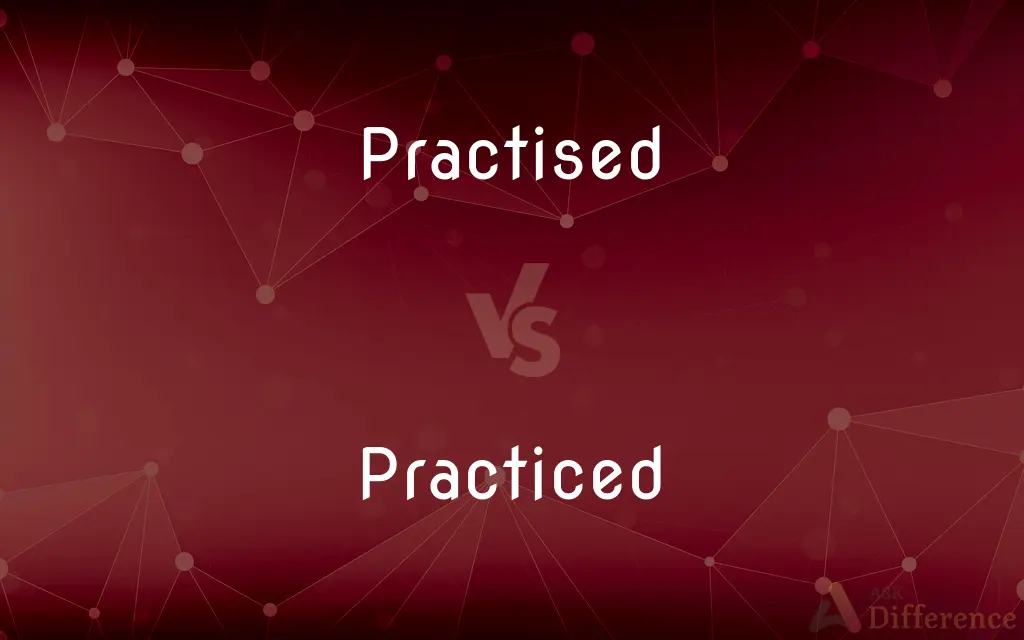Practised vs. Practiced — What's the Difference?
By Fiza Rafique & Maham Liaqat — Updated on April 7, 2024
Practised and practiced differ mainly in spelling; "practised" is preferred in British English, while "practiced" is the American standard, both referring to the act of doing something repeatedly to improve.

Difference Between Practised and Practiced
Table of Contents
ADVERTISEMENT
Key Differences
Practised, often seen in British English, denotes the action of performing or engaging in something repeatedly to become proficient. Whereas in American English, "practiced" is used with the same meaning, reflecting a difference in spelling conventions between the two variants of English.
The distinction between "practised" and "practiced" extends beyond their spelling; it also mirrors the broader discrepancies in British and American English spelling patterns. On the other hand, "practiced" aligns with American preferences for simplifying word endings, as seen in "organized" versus "organised."
When used as a verb, "practised" and "practiced" indicate the habitual action of honing skills or rehearsing. However, in terms of adjectival use, the differences become more pronounced, with "practised" describing someone skilled in British English, and "practiced," while less commonly used as an adjective in American English, conveys a similar meaning.
In educational and professional contexts, the choice between "practised" and "practiced" might reflect not only the writer's or institution's geographic location but also adherence to specific style guides or standards. On the other hand, "practiced" in American texts underscores the importance of consistency in language use, especially in formal writing.
The evolution of language and spelling conventions means that "practised" and "practiced" could be understood universally, despite their regional usage differences. Conversely, "practiced" serves as a reminder of the dynamic and evolving nature of English, adapting to new norms while maintaining clear communication.
ADVERTISEMENT
Comparison Chart
Spelling Variants
British English
American English
Usage
Verb and adjective, indicating repeated action or skill
Verb and adjective, indicating repeated action or skill
Example Sentences (Verb)
He practised the piano daily.
He practiced the piano daily.
Example Sentences (Adjective)
She is a practised public speaker.
She is a practiced public speaker.
Considerations in Writing
Preferred in texts adhering to British spelling standards
Preferred in texts adhering to American spelling standards
Compare with Definitions
Practised
Engaging in an activity repeatedly to improve.
She practised her speech for hours.
Practiced
Indicates adherence to American spelling norms.
The practiced lawyer handled the case with ease.
Practised
Reflects adherence to British spelling conventions.
The manuscript was carefully practised before submission.
Practiced
Commonly seen in American textbooks.
Students practiced their essays for weeks.
Practised
Skilled as a result of repetition.
He is a practised negotiator.
Practiced
Experienced, having repeatedly performed an activity.
She is a practiced speaker, captivating her audience every time.
Practised
Often seen in British curriculum materials.
The students practised their multiplication tables.
Practiced
The accepted spelling for both uses.
His practiced approach to problem-solving is well-regarded.
Practised
The standard spelling for both verb and adjective forms.
Her practised routine impressed everyone.
Practiced
Performing or executing repeatedly to gain skill.
He practiced the violin every evening.
Practised
(Commonwealth) practiced
Practiced
Skilled or expert; proficient
He is practiced in the art of design. She is a practiced lecturer.
Practised
(Commonwealth) practise
Practiced
Acquired or brought to perfection by practice
Greeted the guests with practiced courtesy.
Practised
Skillful after much practice
Practiced
Skillful, proficient, knowledgeable or expert as a result of practice
Practiced
Simple past tense and past participle of practice
Practiced
Experienced; expert; skilled; as, a practiced marksman.
Practiced
Used habitually; learned by practice.
Practiced
Having or showing knowledge and skill and aptitude;
Adept in handicrafts
An adept juggler
An expert job
A good mechanic
A practiced marksman
A proficient engineer
A lesser-known but no less skillful composer
The effect was achieved by skillful retouching
Practiced
Skillful after much practice
Common Curiosities
Why does British English use "practised" while American English uses "practiced"?
It reflects broader differences in spelling conventions between British and American English.
Are there any contexts where one spelling is preferred over the other?
Yes, in formal writing, the choice often aligns with the prevailing regional spelling standards.
What is the main difference between "practised" and "practiced"?
The main difference is regional spelling; "practised" is British, and "practiced" is American.
Can "practised" and "practiced" be used interchangeably?
Yes, but usage depends on whether you're following British or American spelling conventions.
Is there a difference in pronunciation between "practised" and "practiced"?
No, they are pronounced the same.
Can "practiced" be used as an adjective in American English?
Yes, it can describe someone who is experienced or skilled.
Are there any exceptions to using "practised" in British English and "practiced" in American English?
Not typically; the distinction is quite consistent.
Do both spellings convey the same level of skill or proficiency?
Yes, both indicate proficiency gained through repetition.
Is the spelling difference recognized globally?
Yes, the distinction is recognized and respected in English-speaking countries worldwide.
Is "practised" ever used in American English?
Rarely, as "practiced" is the standard spelling in American English.
Does the choice between "practised" and "practiced" affect comprehension?
No, the meaning is clear regardless of spelling.
How can I remember which spelling to use?
Associate "practised" with British English and "practiced" with American English.
In digital content, which spelling should be used?
It depends on the intended audience's location and the default language setting of the website.
How do style guides influence the choice between "practised" and "practiced"?
Style guides may dictate the preferred spelling based on the target audience's regional English.
Can the use of one spelling over the other influence a reader's perception of the text?
Yes, it may signal to the reader the origin of the text or the writer's linguistic background.
Share Your Discovery

Previous Comparison
Refamiliarise vs. Familiarise
Next Comparison
Dye vs. StainAuthor Spotlight
Written by
Fiza RafiqueFiza Rafique is a skilled content writer at AskDifference.com, where she meticulously refines and enhances written pieces. Drawing from her vast editorial expertise, Fiza ensures clarity, accuracy, and precision in every article. Passionate about language, she continually seeks to elevate the quality of content for readers worldwide.
Co-written by
Maham Liaqat















































